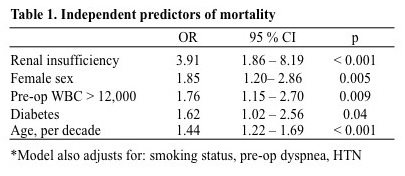|
Back to 2016 Annual Symposium Abstacts
The Current Rate and Predictors of 30-Day Mortality Following Open Revascularization for Acute Mesenteric Ischemia (AMI)
Nicholas J. Swerdlow, MD, Peter A. Soden, MD, Sara L. Zettervall, MD, John McCallum, MD, Klaas Ultee, BS, MPH, Jeremy Darling, BA, Mark C. Wyers, MD, Marc L. Schermerhorn, MD.
Beth Israel Deaconess Medical Center, Boston, MA, USA.
OBJECTIVES: Despite increases in endovascular intervention, open surgical revascularization for AMI, a rare condition with high mortality, is not declining. Historically, single center and administrative studies have reported peri-operative mortality of approximately 35%. Our aim was to define the current 30-day mortality rate and its predictors for patients undergoing open surgical revascularization.
METHODS: We identified all patients with a diagnosis of AMI who underwent open surgical repair, in the ACS-NSQIP from 2005 - 2013. 30-day mortality and perioperative complications were evaluated and independent predictors of mortality were identified using multivariable logistic regression.
RESULTS: 563 patients (62% female, mean age 69 ±14) underwent surgical intervention for AMI; 218 (39%) mesenteric bypass, 290 (52%) embolectomy, and 55 (10%) endarterectomy alone. Overall the 30-day mortality was 31% (24% after bypass, 36% embolectomy, 25% endarterectomy [p=0.006]). Bowel resection was most common among patients undergoing embolectomy (44% vs. 24% for bypass and 29% endarterectomy [p= 48 hrs). In multivariable analysis, preoperative independent predictors of death included renal insufficiency, female sex, pre-op WBC count > 12,000, diabetes, and age (Table). Only pre-operative WBC > 12,000 (OR 2.01, 95% CI 1.38 - 52.92) was identified as an independent risk factor for respiratory complications.
CONCLUSIONS: Patients undergoing open surgical revascularization for AMI have a high rate of mortality, particularly following bowel resection, but it has decreased from prior reports despite the increased use of endovascular interventions. The mortality associated with bowel resection stresses the importance of early diagnosis and revascularization with AMI.

Back to 2016 Annual Symposium Abstacts
|







